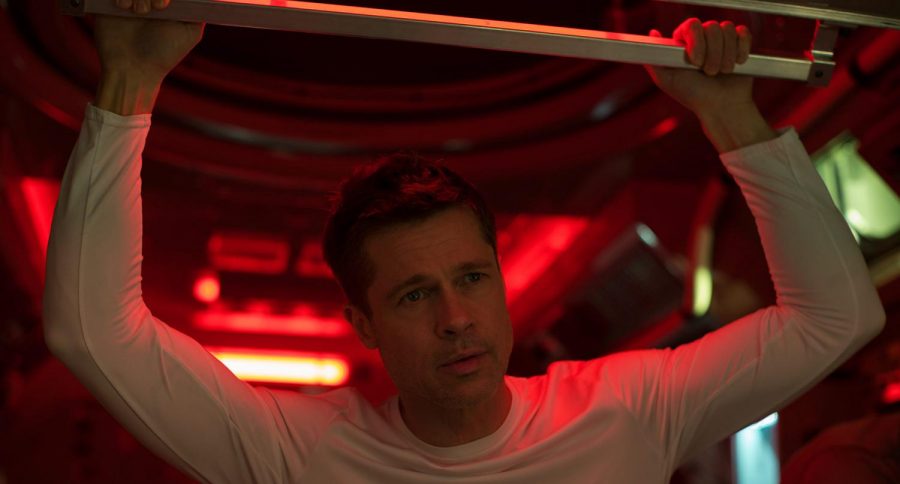REVIEW: ‘Ad Astra’ a new contender for best picture come Oscar season
Brad Pitt’s performance steals the show in an already amazing movie
Brad Pitt as Roy McBride in 20th Century Fox’s “Ad Astra.” Pitt’s portrayal combines his skills as a character actor with his leading man looks. Courtesy of 20th Century Fox.
October 2, 2019
This review contains spoilers for “Ad Astra.”
“Ad Astra” might just be one of my favorite films of the year.
The story was gripping, with a layer of social commentary that was subdued but effective. The world-building was very apparent while not beating the audience over the head with examples of future technology. The visuals were absolutely breathtaking, and star Brad Pitt gave one the best performances of his career.
All right… Now with that out of the way, let’s get down to the nitty-gritty.
Major Roy McBride, played by Pitt, is a highly decorated astronaut and military veteran. His career path mimics that of his father H. Clifford McBride, played by Tommy Lee Jones, a deep space explorer who was presumed dead after 16 years without contact after his ship’s signal went dark near Neptune.
McBride is known for his ability to stay calm under intense periods of stress, and it is noted multiple times that even under the most dire of circumstances his heart rate never increases over 80 beats per minute, making him an ideal candidate for dangerous missions.
As Earth begins experiencing electromagnetic waves, causing the failure of electronics around the world and the loss of thousands of lives, the U.S government begins to suspect that it might be related to his father’s mission of detecting intelligent life amongst the stars.
McBride is briefed and sent to Mars in an attempt to contact his father to see if he is behind it.
Director James Gray set out to tell a story that asks the question “what is it that makes us turn into our fathers?”
McBride is by no definition a family-man. He has repeatedly chosen his career over his wife, to the point of her leaving him, and he said his reason for not wanting children is because he wouldn’t want to put anyone else in harm’s way. These beliefs stem from McBride’s troubled past in which his father left him and his mother in pursuit of his own career due to not being able to break free from his own ego.
Throughout the film, McBride is forced to choose between the lives of others and the success of his mission, each time having to conquer his own demons and determine if he too will fall victim to the same madness that took his father.
As we watch the events of the story unfold, we begin to understand the circumstances of his father’s madness more and more. The effects on the mind of being in isolation for extended periods of time becomes more apparent as McBride suffers through a multiple-month-long journey to the outer reaches of the solar system.
While this film isn’t as action-packed as I suspected, there were still multiple times I was gripping the edge of my seat as McBride dodged laser-beams from space pirates (hell yeah), and tussled with unexpected foes in close quarters.
In an already sparkling film, there is one element that burns brighter than the others: Pitt’s performance.
It has been said all throughout Pitt’s career that he is a character actor stuck in a leading man’s body. Gray was able to find the perfect balance between the two here, as he showcases this deep, thought-provoking character of McBride in the glorious human vessel that is Brad Pitt — seriously, how does he still look this good at 55?
McBride is not a man of many words or emotions. He stuffs his problems down, hides his feelings, and focuses on the job at hand; that’s how he was raised. But as he goes through this internal struggle of becoming his father, and losing touch with who he thought he was, those emotions begin to bubble back to the surface and that is where Pitt shines.
Pitt manages to find the perfect balance between stoicism and anger in the character that is highlighted beautifully through Gray’s lingering shots and close-ups on Pitt’s face.
The visuals in this movie also play a big part in developing the emotions of the characters as well. As we watch McBride’s ship fly through the blackness of space, illuminated only by the reflections of planets and starlight, you really feel the isolation and loneliness that he is going through.
The use of lighting in ornamenting and hiding characters also was top-notch, and continuously reminded me of Denis Villeneuve’s “Blade Runner 2049.”
It could also be argued that there is a not-so-subtle secular force behind the story as Pitt’s literal search for his father, as well as Jones’ search for intelligent life, will undoubtedly be interpreted as a figurative search for the creator, and reasoning of life itself.
All things considered, “Ad Astra” might just be my favorite film of the year; you definitely don’t want to miss this one in theaters. The shots of McBride’s ship flying through space, and the deep deafening silences that accompany them, are worth the cost of the ticket alone.





























































































































